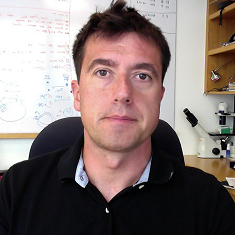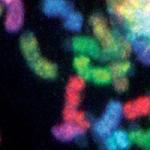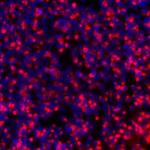
Research Topics
We study the mechanisms by which telomeres protect chromosome ends, thus ensuring chromosome and genome stability. Our lab focuses on the identification of telomere-associated proteins to define their role in preventing activation of the DNA damage response pathway and suppression of end-to-end chromosomal fusions. We also study how telomere-associated proteins regulate the balance between telomere elongation and telomere erosion, thus controlling the replicative potential of normal as well as cancer cells. Identification of novel factors that play a role in telomere biology is carried out in the lab using proteomics as well as genetic screens.
A complementary study in our lab is focused on the in vivo consequences of telomere dysfunction. Telomere length homeostasis plays a critical role in cellular and organism survival. However, in humans, this process is inefficient and progressive telomere shortening is observed in tissues with a high cellular turnover. In the lab, we probe the role of telomere shortening in aging and tumor onset using mouse models that recapitulate telomere dysfunction in stem cells and other cellular compartments.
The Lazzerini Denchi Lab, March 2022
Biography
Dr. Eros Lazzerini Denchi earned his M.S. in biology from the Universita’ Statale di Milano and received his Ph.D. in molecular oncology from the European Institute of Oncology (Milan, Italy) working in the laboratory of Prof. Kristian Helin. He completed his postdoctoral training in the laboratory of Prof. Titia de Lange at The Rockefeller University, New York, and worked as an independent researcher at The Scripps Research Institute, La Jolla, CA. Dr. Lazzerini Denchi became a Senior Investigator in 2021.
Selected Publications
- Azeroglu B, Ozbun L, Pegoraro G, Lazzerini Denchi E. Native FISH: A low- and high-throughput assay to analyze the alternative lengthening of telomere (ALT) pathway. Methods Cell Biol. 2024;182:265-284.
- Moreno SP, Fusté JM, Kaiser M, Li JSZ, Nassour J, Haggblom C, Denchi EL, Karlseder J. TZAP overexpression induces telomere dysfunction and ALT-like activity in ATRX/DAXX-deficient cells. iScience. 2023;26(4):106405.
- Markiewicz-Potoczny M, Lobanova A, Loeb AM, Kirak O, Olbrich T, Ruiz S, Lazzerini Denchi E. TRF2-mediated telomere protection is dispensable in pluripotent stem cells. Nature. 2021;589(7840):110-115.
- Loe TK, Li JSZ, Zhang Y, Azeroglu B, Boddy MN, Denchi EL. Telomere length heterogeneity in ALT cells is maintained by PML-dependent localization of the BTR complex to telomeres. Genes Dev. 2020;34(9-10):650-662.
- Li C, Stoma S, Lotta LA, Warner S, Albrecht E, Allione A, Arp PP, Broer L, Buxton JL, Da Silva Couto Alves A, Deelen J, Fedko IO, Gordon SD, Jiang T, Karlsson R, Kerrison N, Loe TK, Mangino M, Milaneschi Y, Miraglio B, Pervjakova N, Russo A, Surakka I, van der Spek A, Verhoeven JE, Amin N, Beekman M, Blakemore AI, Canzian F, Hamby SE, Hottenga JJ, Jones PD, Jousilahti P, Mägi R, Medland SE, Montgomery GW, Nyholt DR, Perola M, Pietiläinen KH, Salomaa V, Sillanpää E, Suchiman HE, van Heemst D, Willemsen G, Agudo A, Boeing H, Boomsma DI, Chirlaque MD, Fagherazzi G, Ferrari P, Franks P, Gieger C, Eriksson JG, Gunter M, Hägg S, Hovatta I, Imaz L, Kaprio J, Kaaks R, Key T, Krogh V, Martin NG, Melander O, Metspalu A, Moreno C, Onland-Moret NC, Nilsson P, Ong KK, Overvad K, Palli D, Panico S, Pedersen NL, Penninx BWJH, Quirós JR, Jarvelin MR, Rodríguez-Barranco M, Scott RA, Severi G, Slagboom PE, Spector TD, Tjonneland A, Trichopoulou A, Tumino R, Uitterlinden AG, van der Schouw YT, van Duijn CM, Weiderpass E, Denchi EL, Matullo G, Butterworth AS, Danesh J, Samani NJ, Wareham NJ, Nelson CP, Langenberg C, Codd V. Genome-wide Association Analysis in Humans Links Nucleotide Metabolism to Leukocyte Telomere Length. Am J Hum Genet. 2020;106(3):389-404.
Related Scientific Focus Areas
This page was last updated on Monday, November 24, 2025




